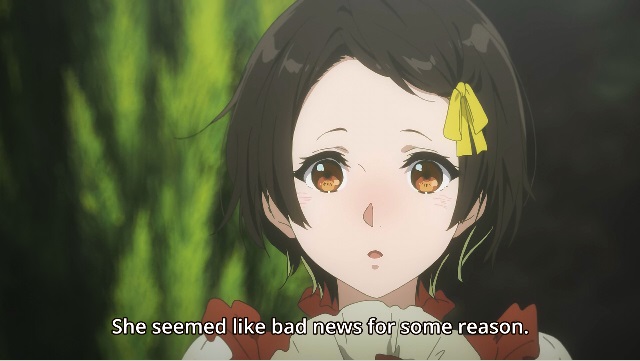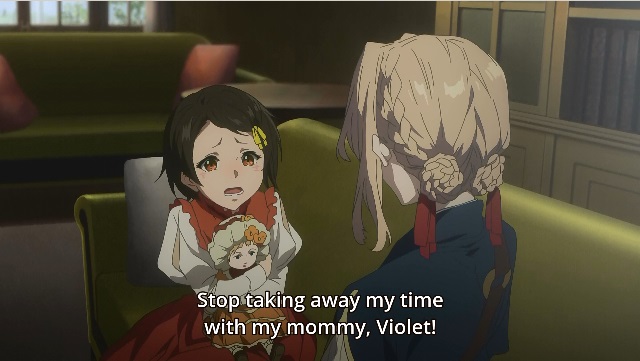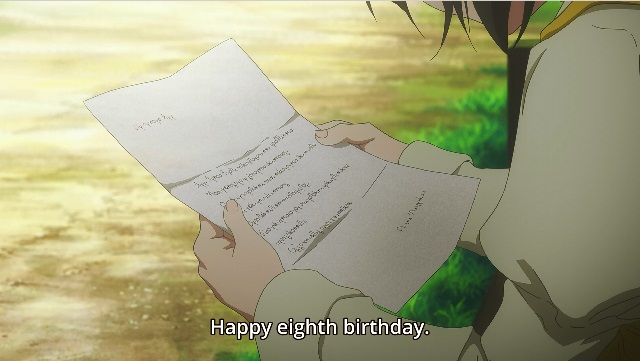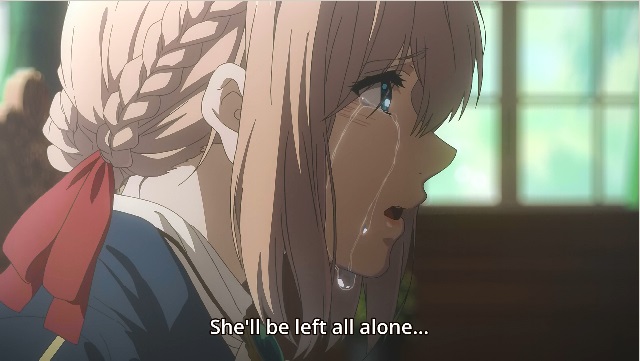Ann is right, Violet Evergarden coming to her house is bad news, though not in the way she thinks it is.

Violet Evergarden, for all the hype it had gotten beforehand, has been somewhat disappointing to me from the start. Violet is an orphan raised as a living weapon, until she came under the command of major Gilbert Bougainville, the first to treat her as a human being. When the series starts she’s in hospital, having had both her arms replaced by mechanical ones as a result of an enemy artillery bombardment in her last mission, which left major Gilbert missing in action. An old friend of the major comes to discharge her from the hospital after peace has broken out and through various circumstances, she comes to work for his Auto Memory Doll company, to learn the meaning of the major’s final words to her: “I Love you”. Auto Memory Dolls write letters for those who can’t write them themselves, because they’re illiterate or need the specific talent of a Doll to write the perfect. Violet, being more doll than human at the start of the series needs to learn how to write in such a way that not just the literal content of the message is conveyed, but the actual emotions behind them, so that in turn she herself becomes more human. It’s not the most original of premises, but a good foundation for an interesting story.
Unfortunately, despite all the technical prowess Kyoto Animation brings to the series (hand animating the letter being typed in this promo video took a month!), emotionally it has fallen a bit flat. The first two episodes establish Violet and her problems with communicating in a way other people can understand, because she fails to understand herself how to word things other than literally, or when or when not to say something. The next five episodes are all one shots, in which Violet travels to meet a client and gets involved in their problems while writing letters for them, featuring as a sort of emotionless shrink who helps them solve these problems. I didn’t find any of these particularly interesting and in the case of episode four, actually infuriating. Therefore the supposed emotional climax of the series in episode eight and nine, where Violet learns that major Gilbert is presumed dead, did little for me. It was predictable, clumsy and contrived. Violet Evergarden was a disappointment, in short.

But then came episode ten. Another simple story, of Violet being hired for a full seven days, so an ill war widow can write the letters she needs to write before she, well, you know, while Ann, her seven year old daughter who’s already a bit lonely, resents Violet from taking away her mother’s limited time with her. As a viewer, you know how this story will end almost from the moment you see the mother in bed fending off grasping relatives. There will be no happy end. You don’t know why these letters need to be written until the very end of the episode, but you can see the desparation of Ann’s mother in trying to get them finished in time even as it eats away at her energy, at the same time sympathising with Ann for being left alone and not comprehending what’s happening, though she understands more than she admits to. It all comes to a head when Ann can’t take anymore and breaks down admitting she knows her mother is dying, running away and finally finding some comfort in Violet’s arms.

But the real payoff comes in the epilogue, after Violet has gone and Ann and her mother are alone again. We get a quick montage of scenes with the both of them at play, with her mother vanishing from the scene, a quick succession of seasonal cues, the inevitable funeral scene in one quick shot and then Ann alone, as she receives the first of the letters her mother wrote for her. And that’s when the tears started. For the first time in the series, the emotional content matched KyoAni’s technical excellence, the latter in perfect service to the former. We see the entire episode through Ann’s eyes, so we sympathise from the start and we are kept as much in the dark as her about the purpose of the letters her mother is writing, so the arrival of the first letter is almost as big a surprise to us as it is to her. This could’ve been pure schmaltz had it been done wrong, but the series does it perfectly. Because we do see everything through Ann’s eyes, we’re not getting spoiled for the payoff and sharing Ann’s grief and happiness at receiving the letter doesn’t feel voyeuristic this way.

Violet’s own response, when she’s back at company headquarters and a co-worker congratulates her on writing fifty letters for Ann and how happy she’ll be to receive them, is excellent as well. She’s overcome by empathy and starts crying, imagining how lonely Ann will be, how her mother will be dead by the time she’ll get her first letter, how young she still is. Having just come to grips with the loss of major Gilbert herself, the one person she herself could call family, she knows exactly what Ann will go through, which is why she gets so upset about it as well. The same goes for me: my wife died some six years ago and that grief and sorrow is still very real to me. Disappointing though it has been in general, episode ten of Violet Garden therefore justified all the hype for me.
No Comments